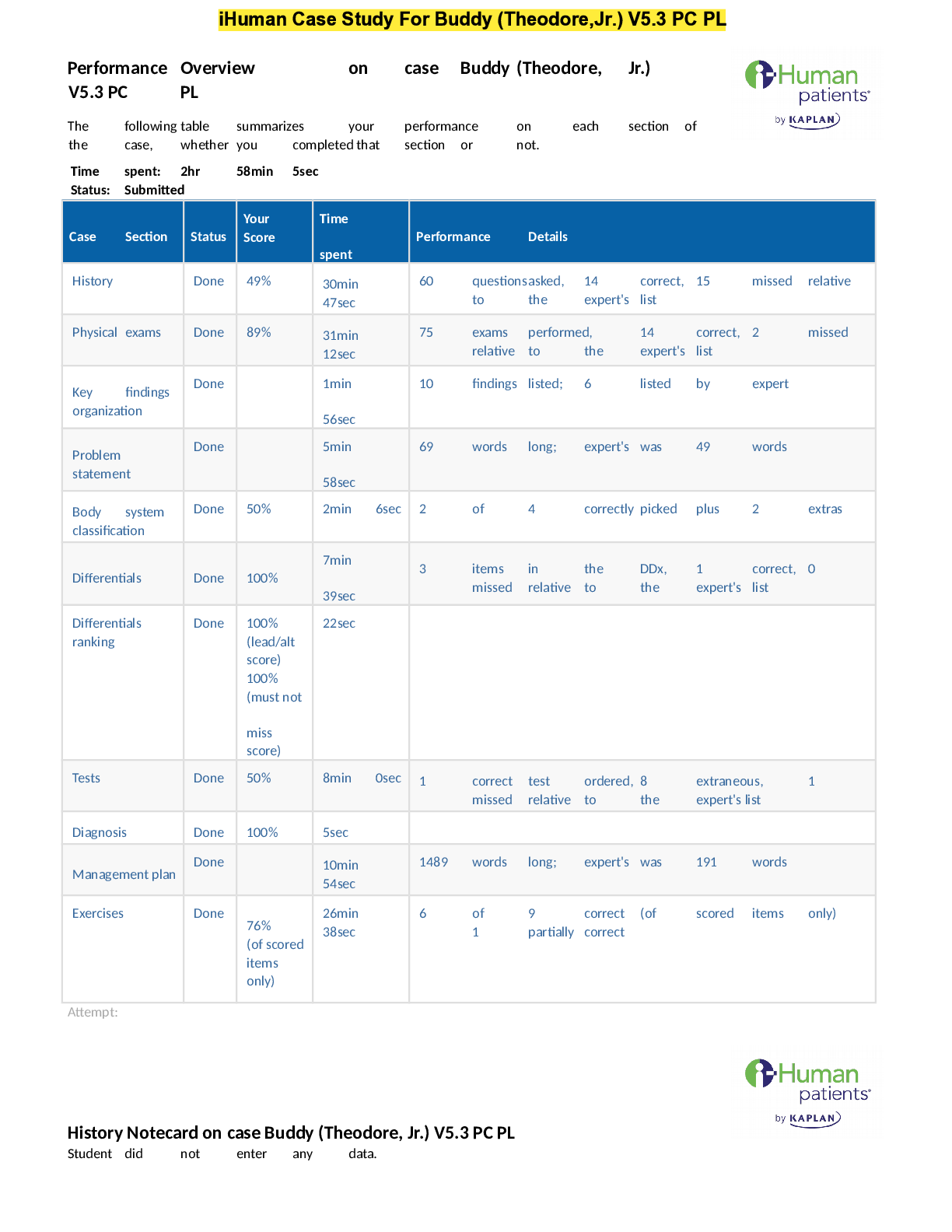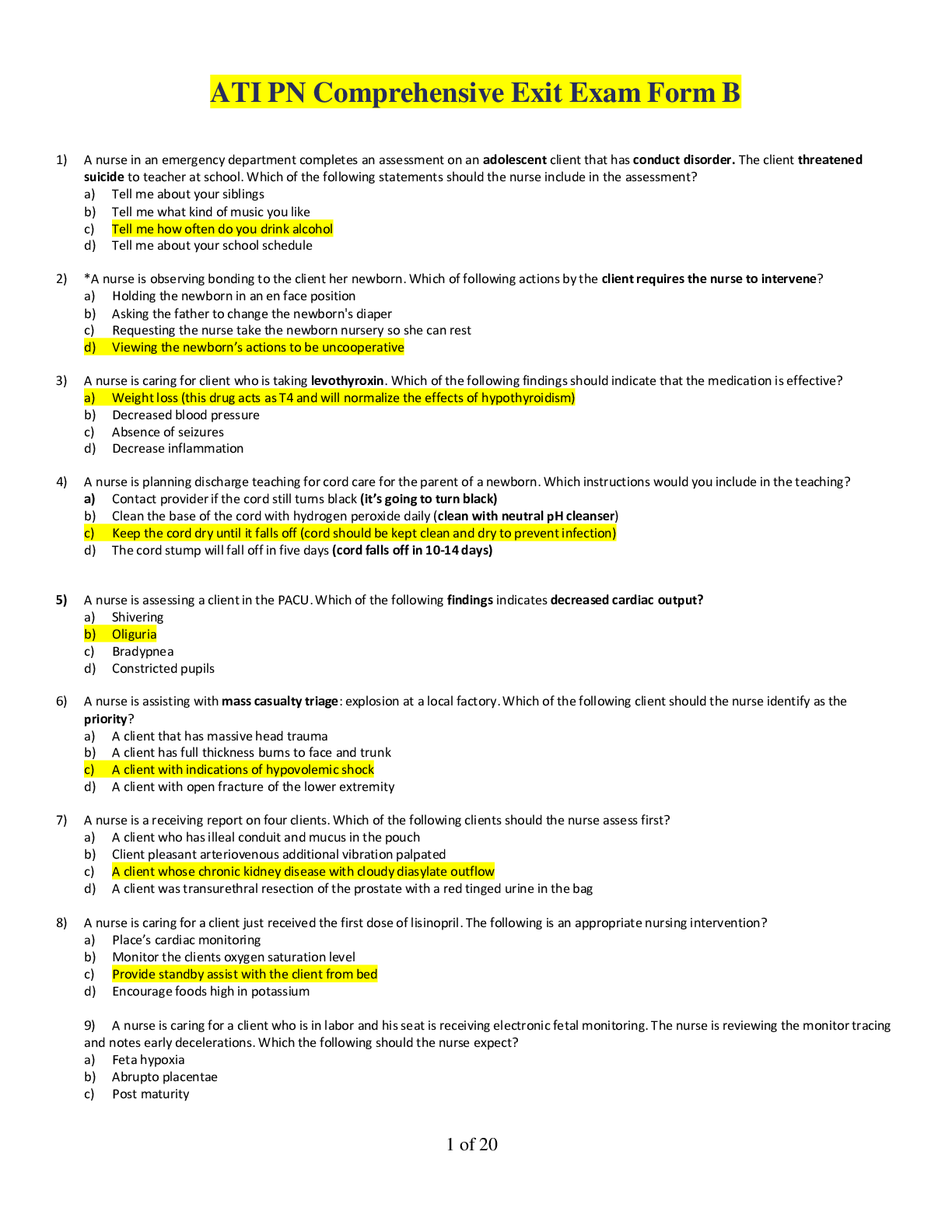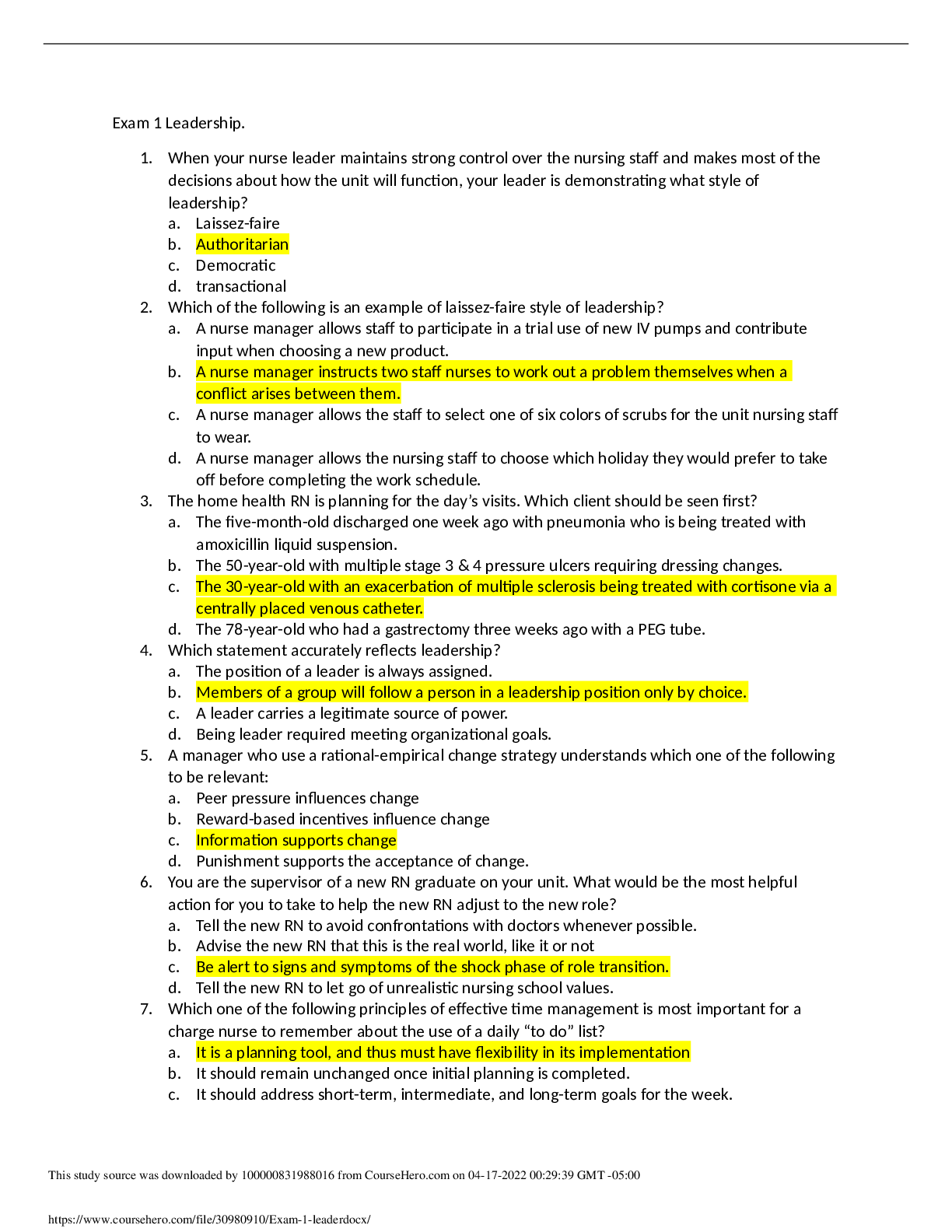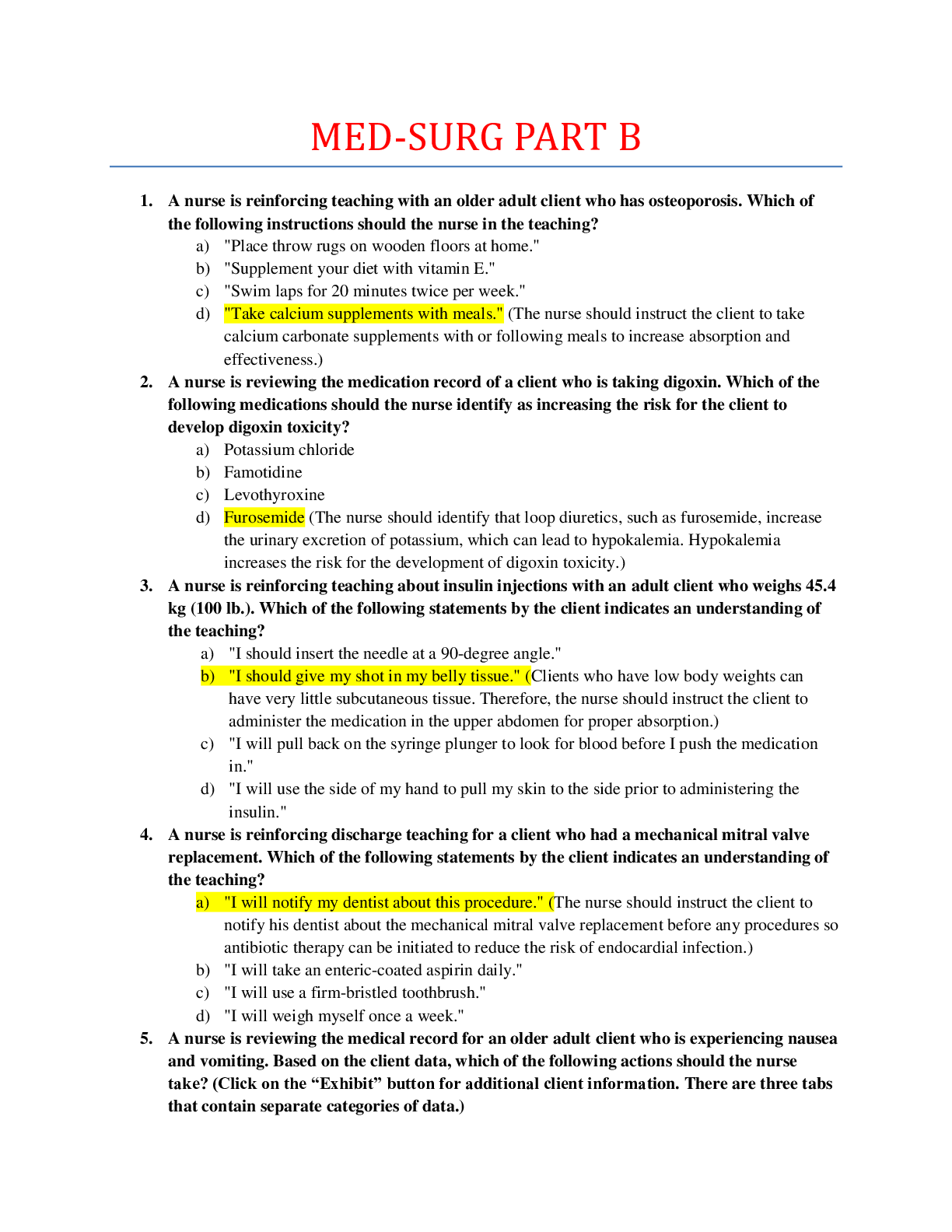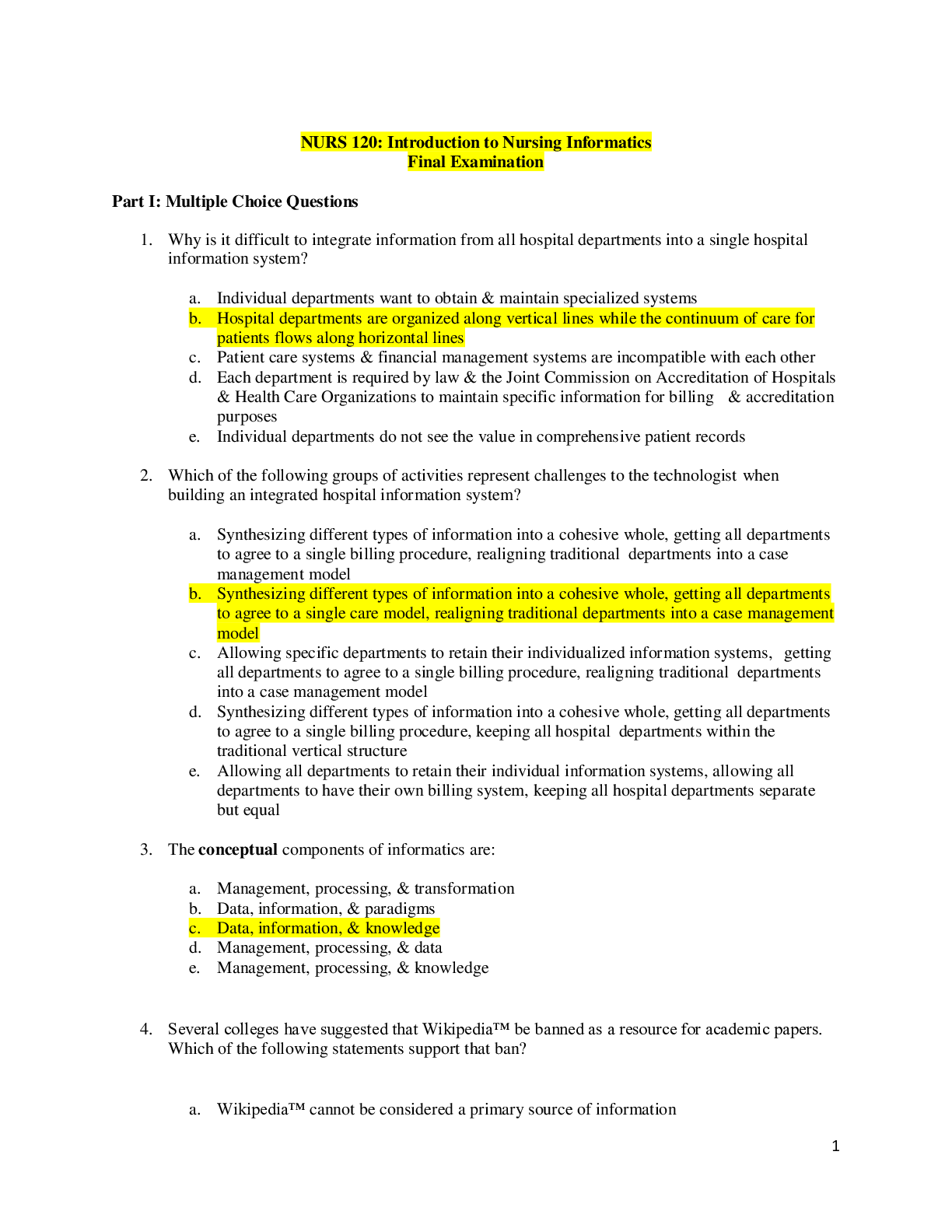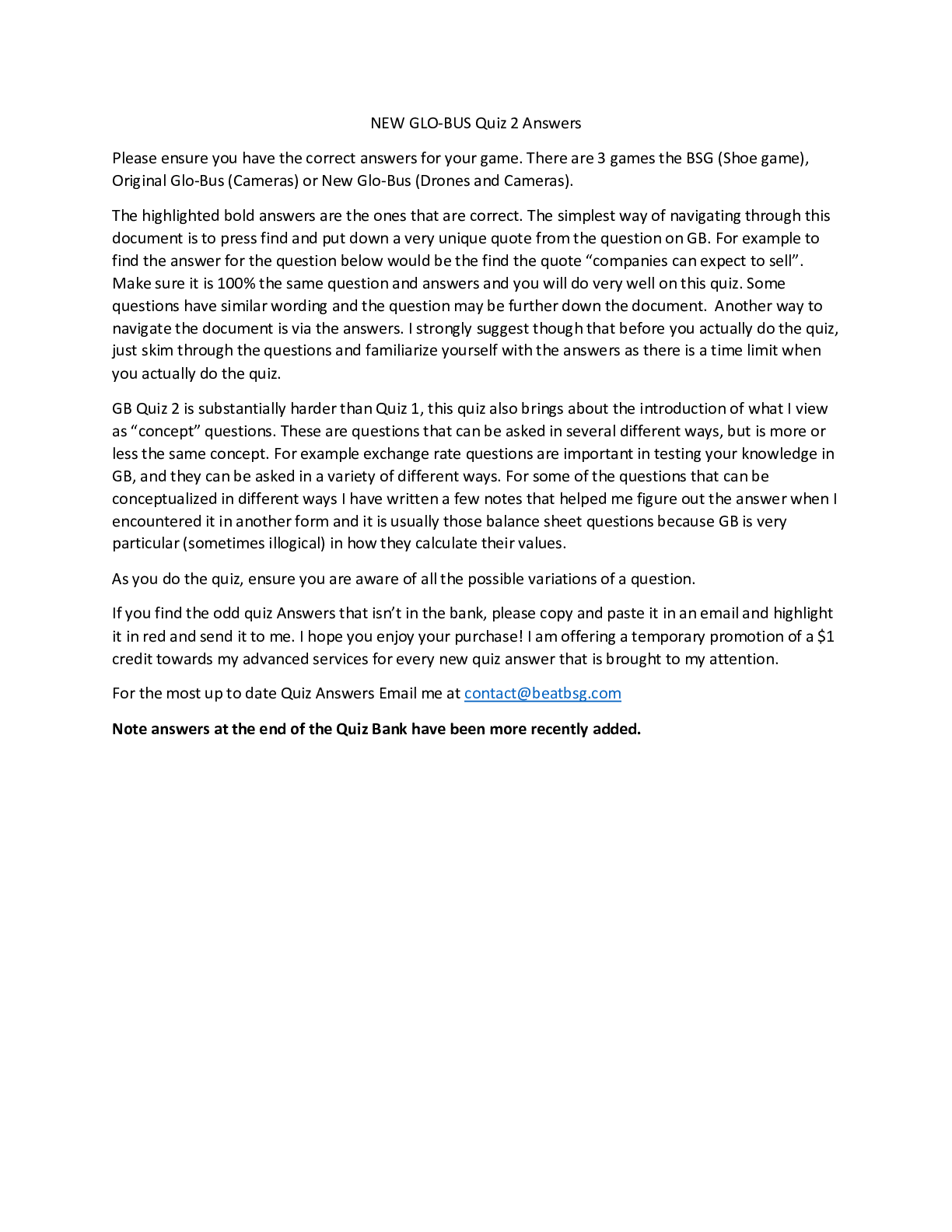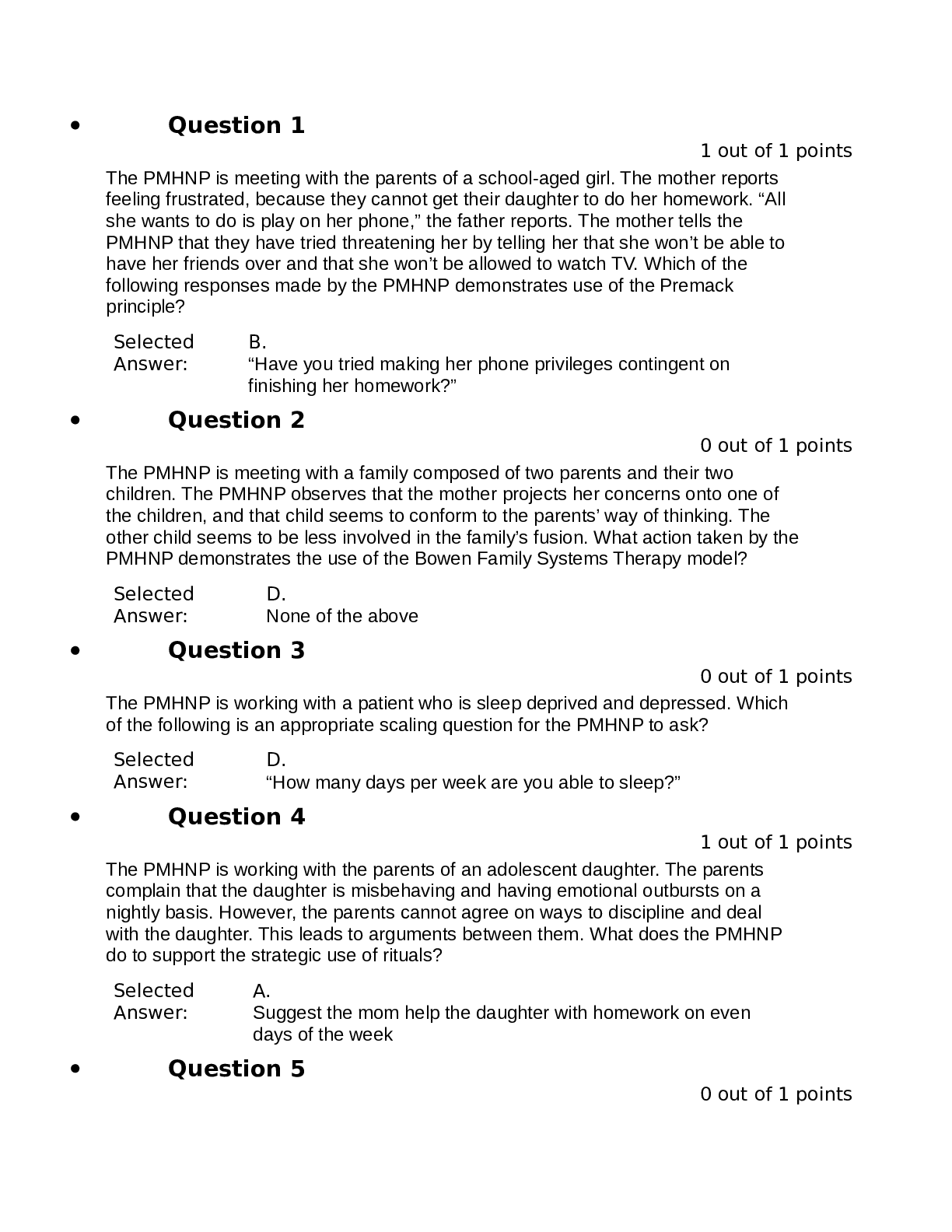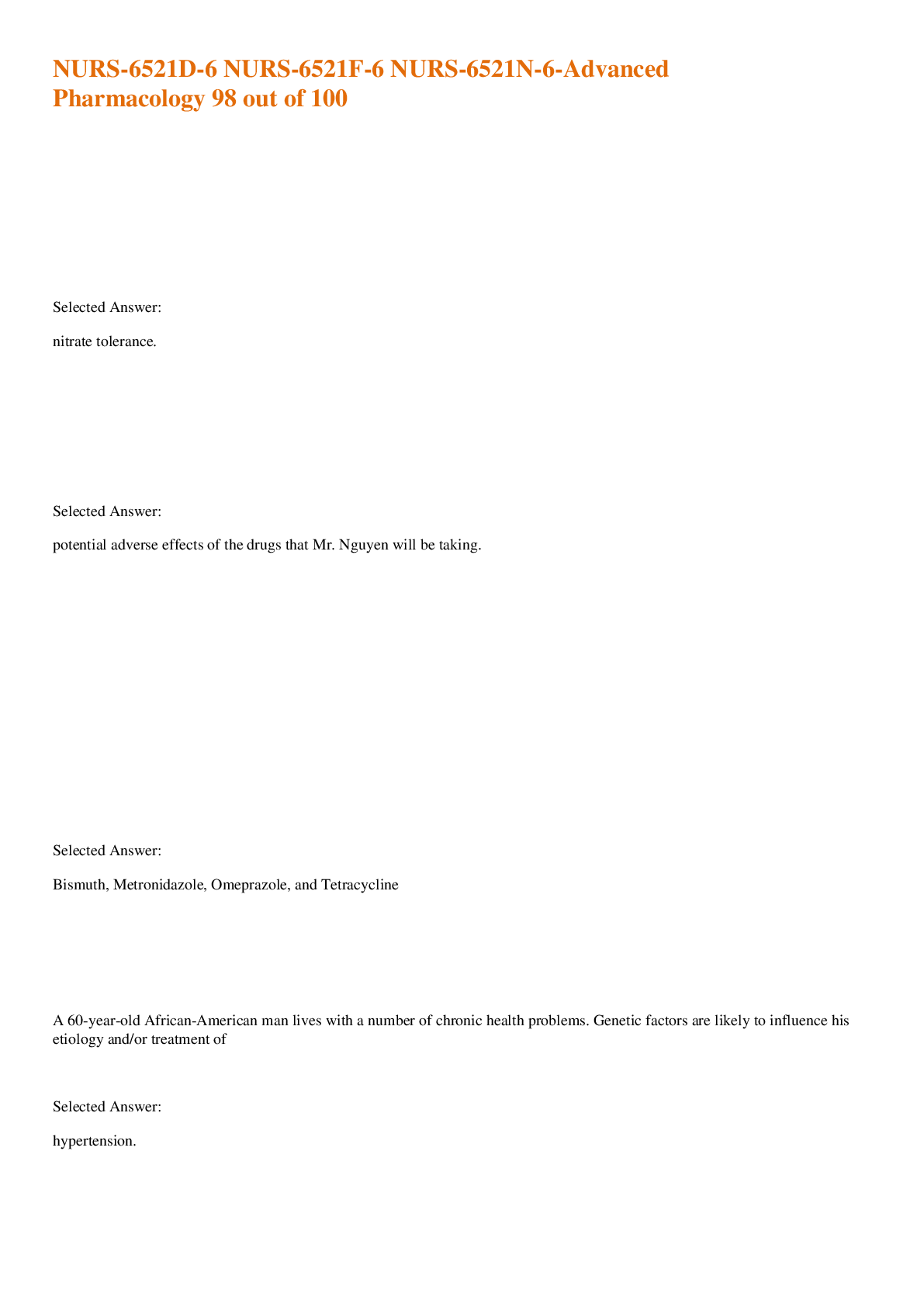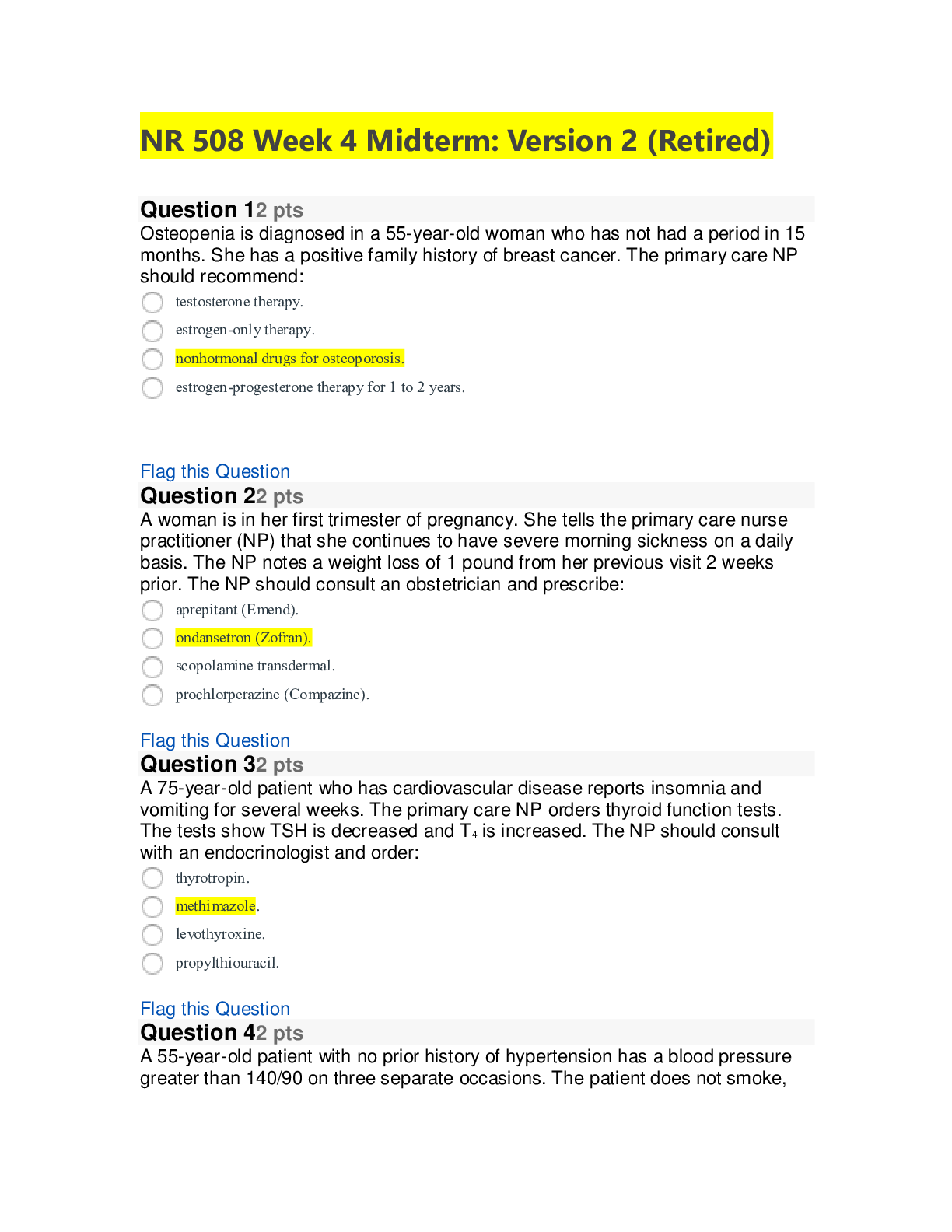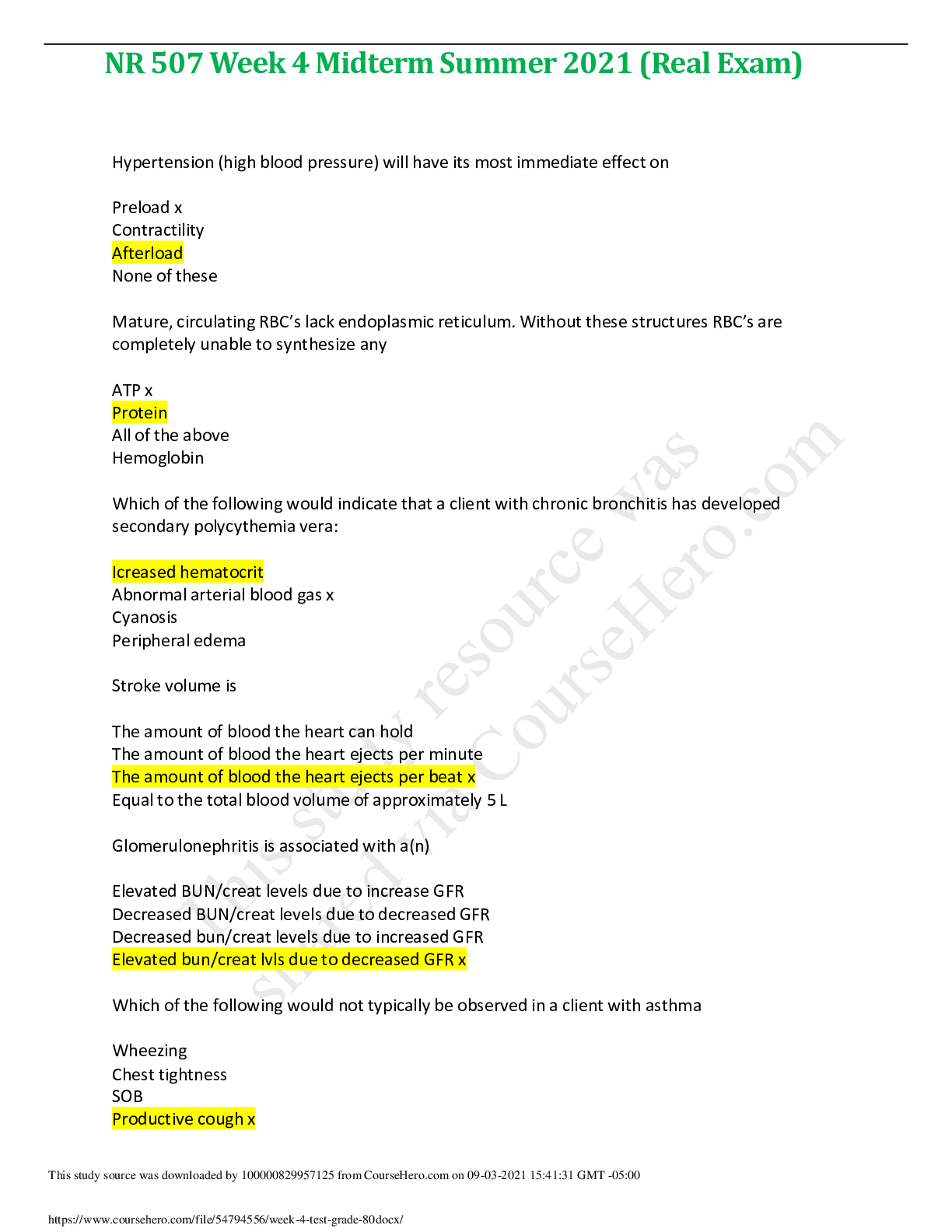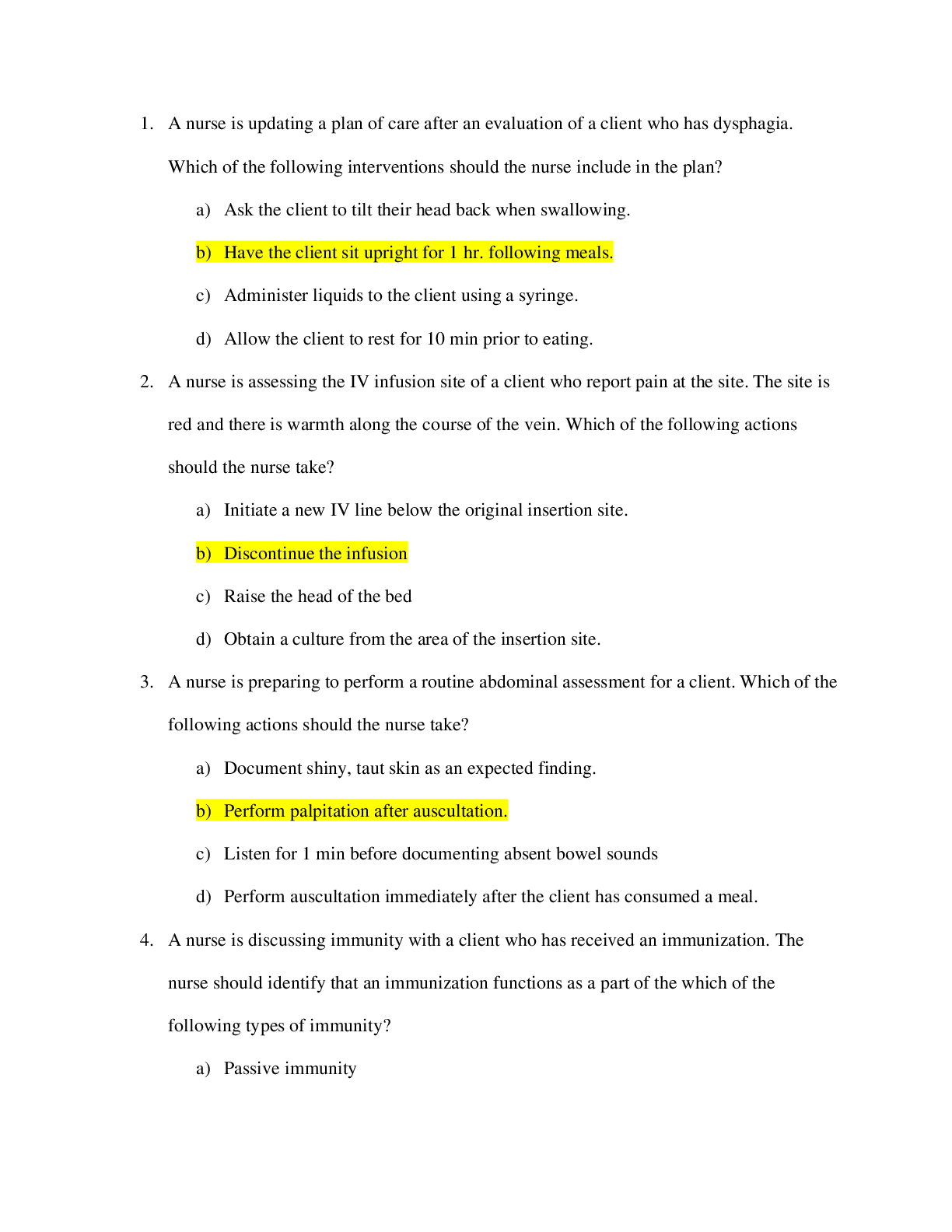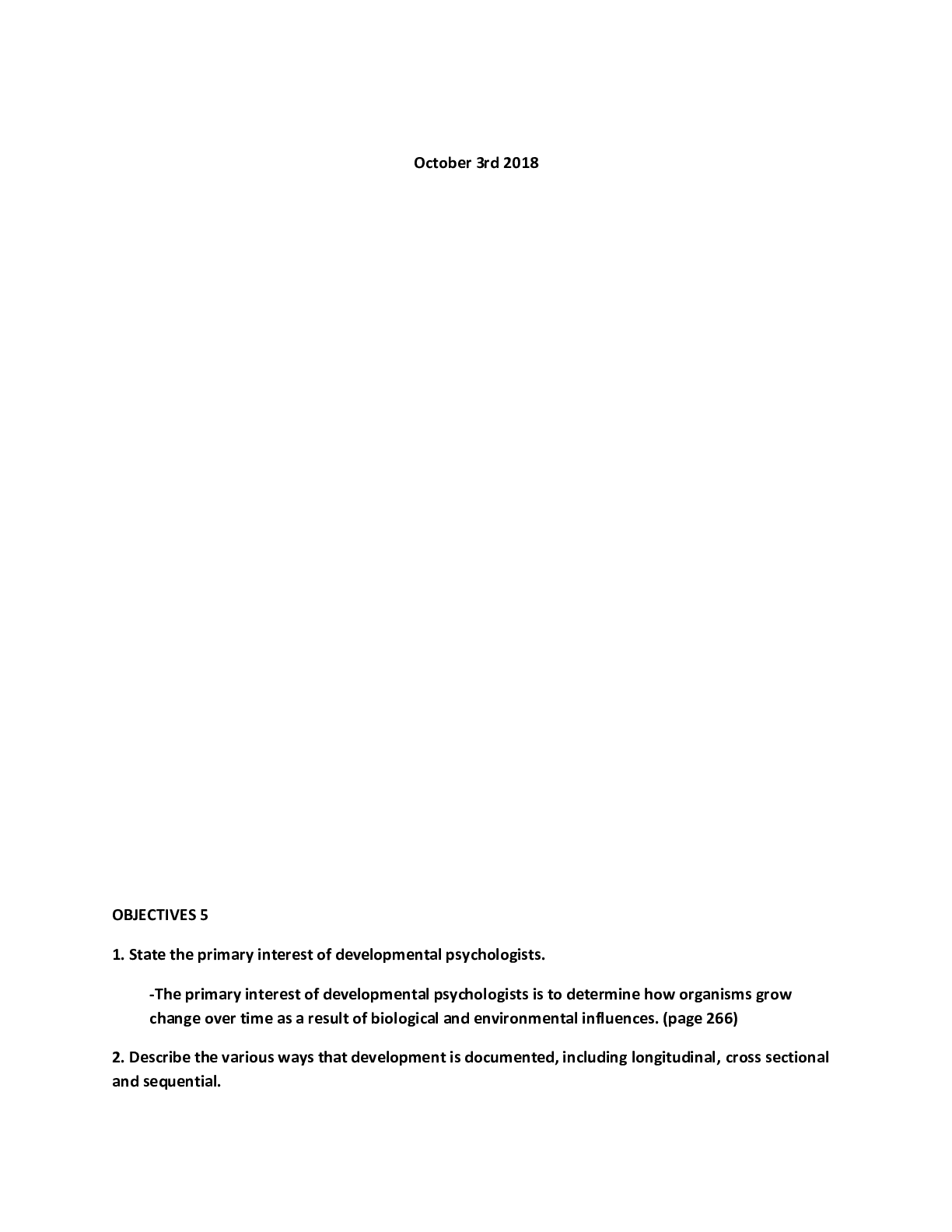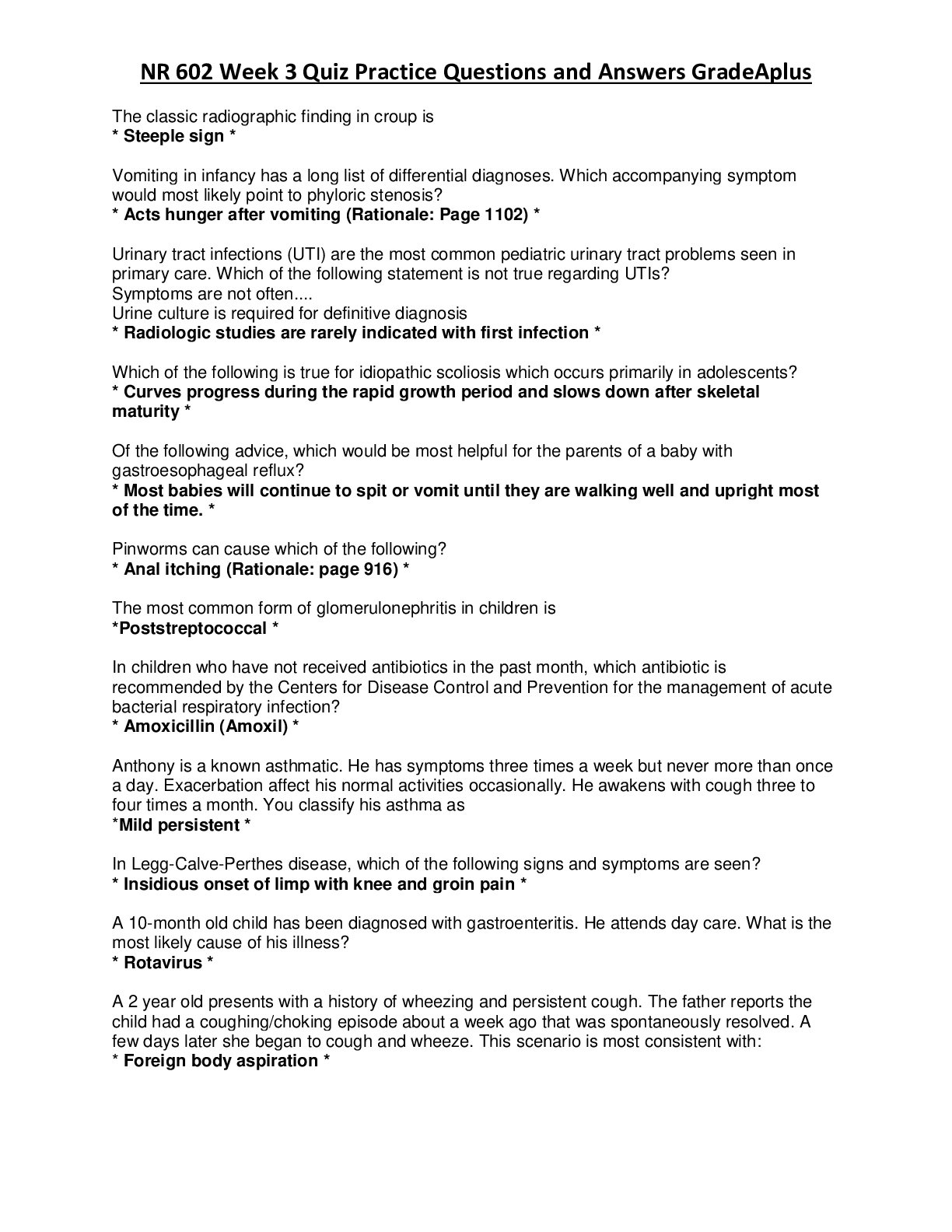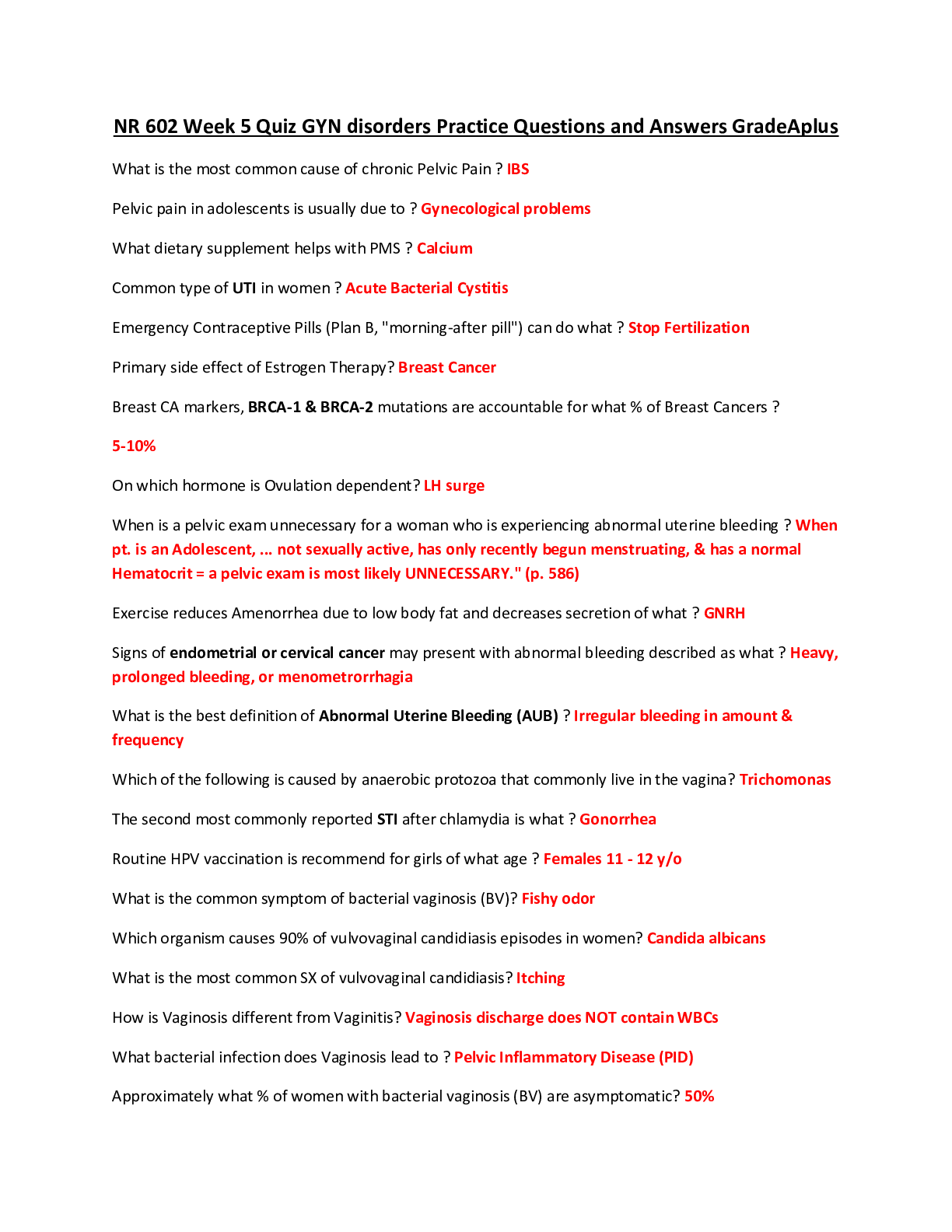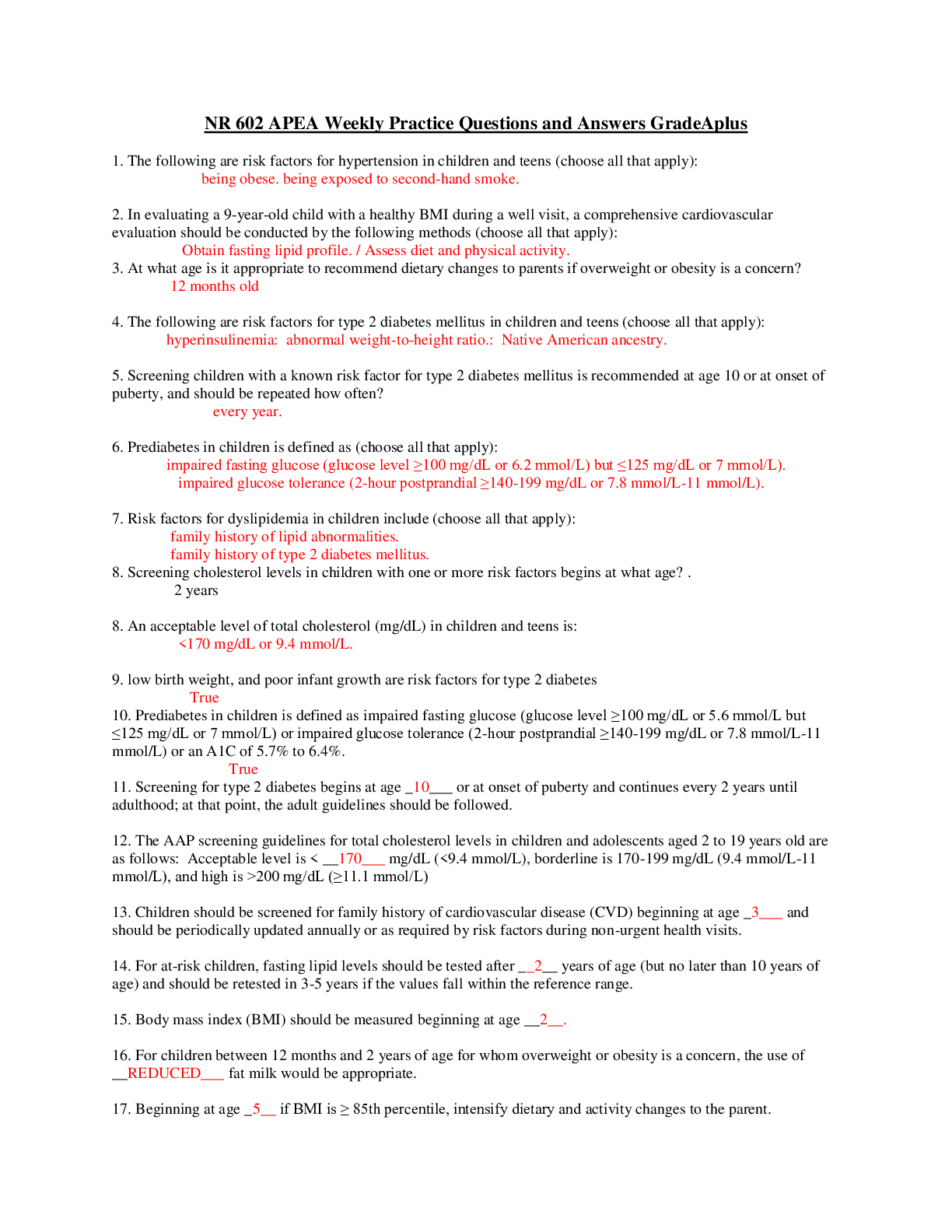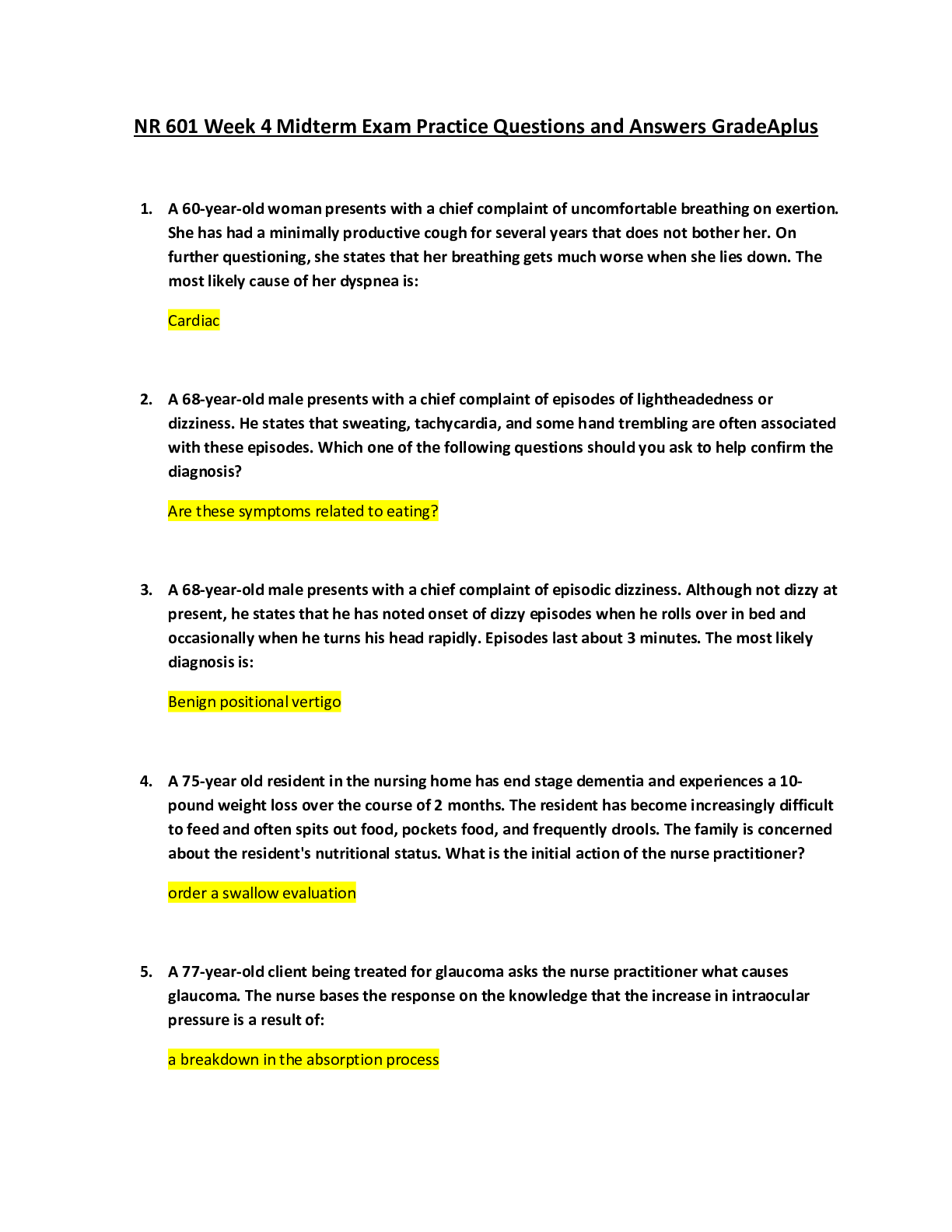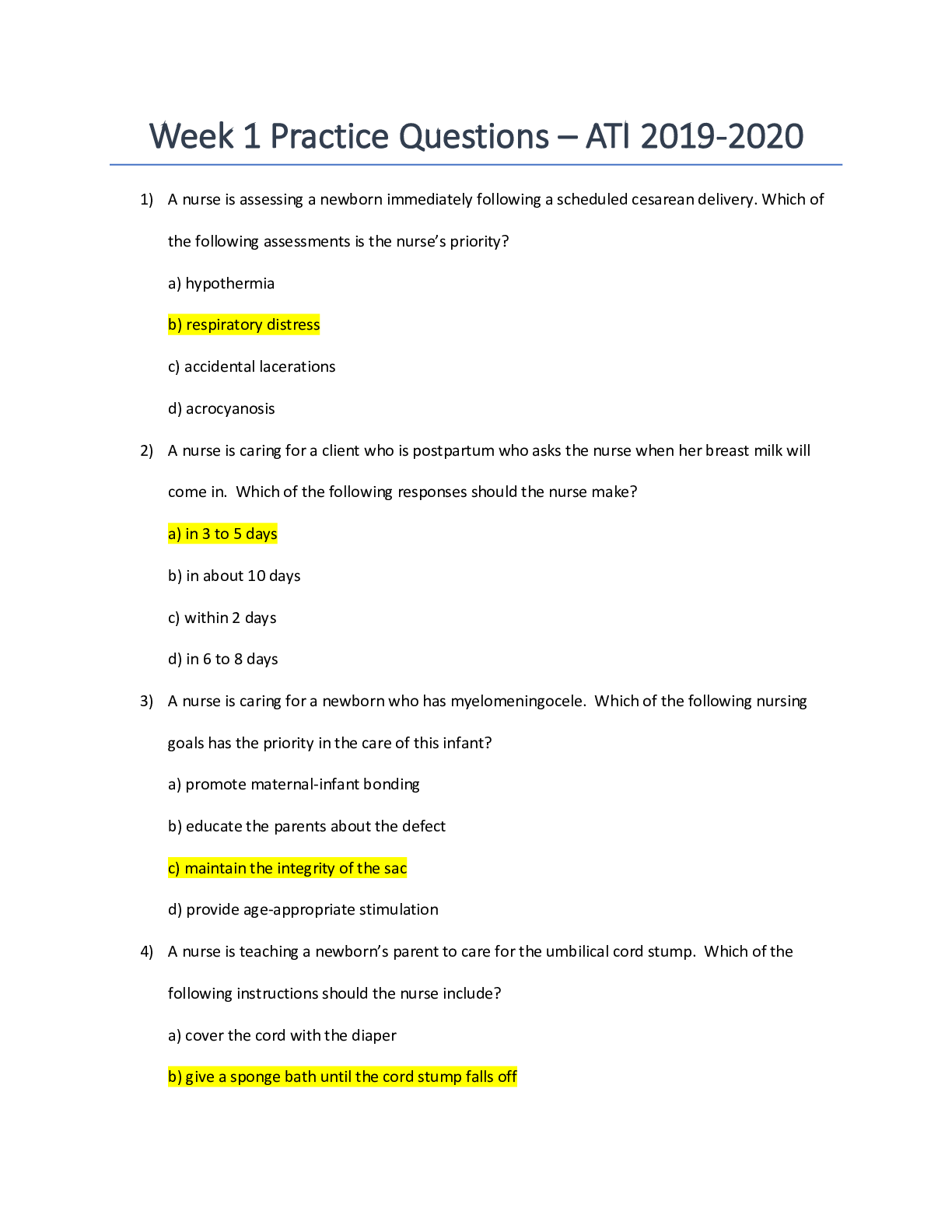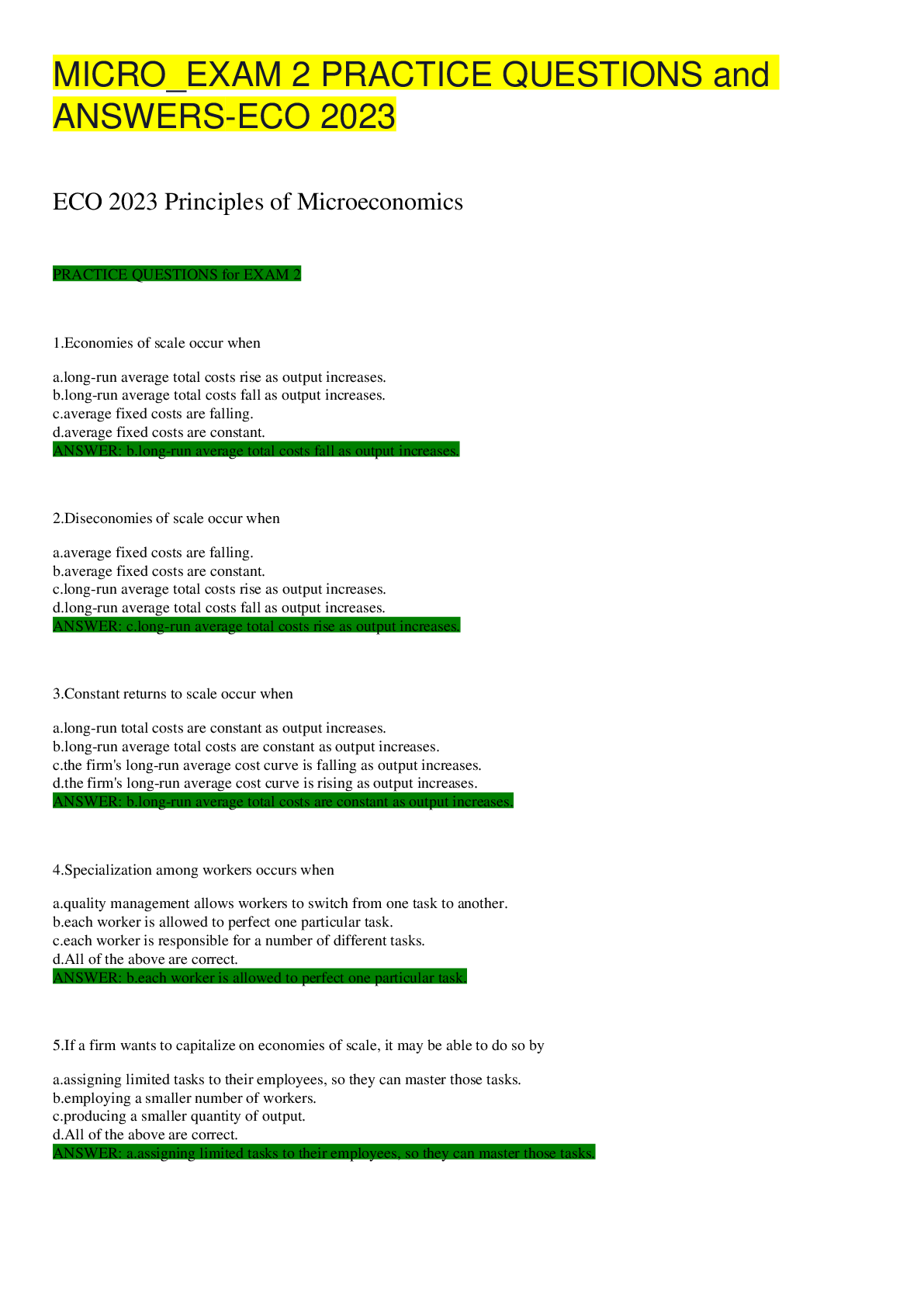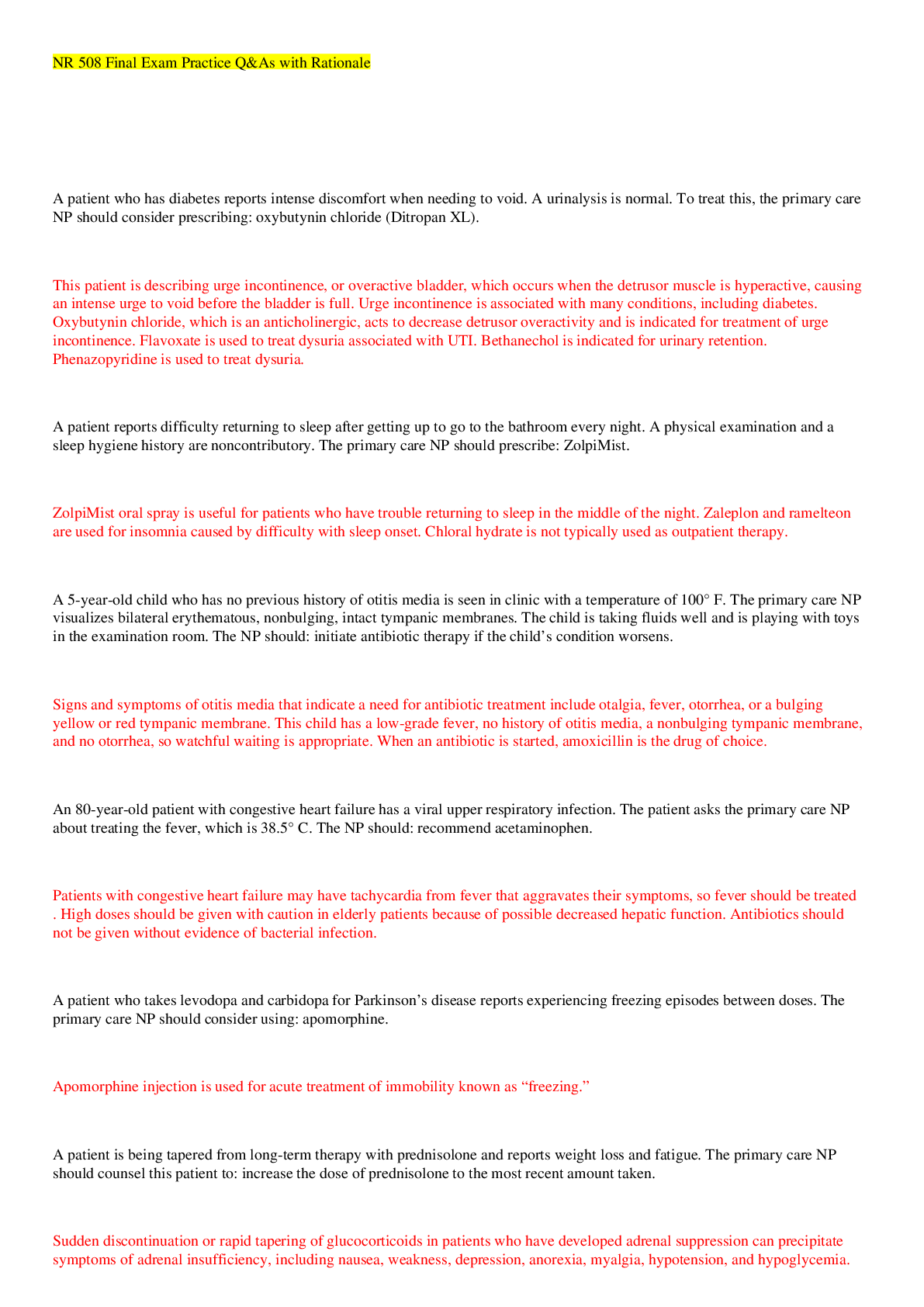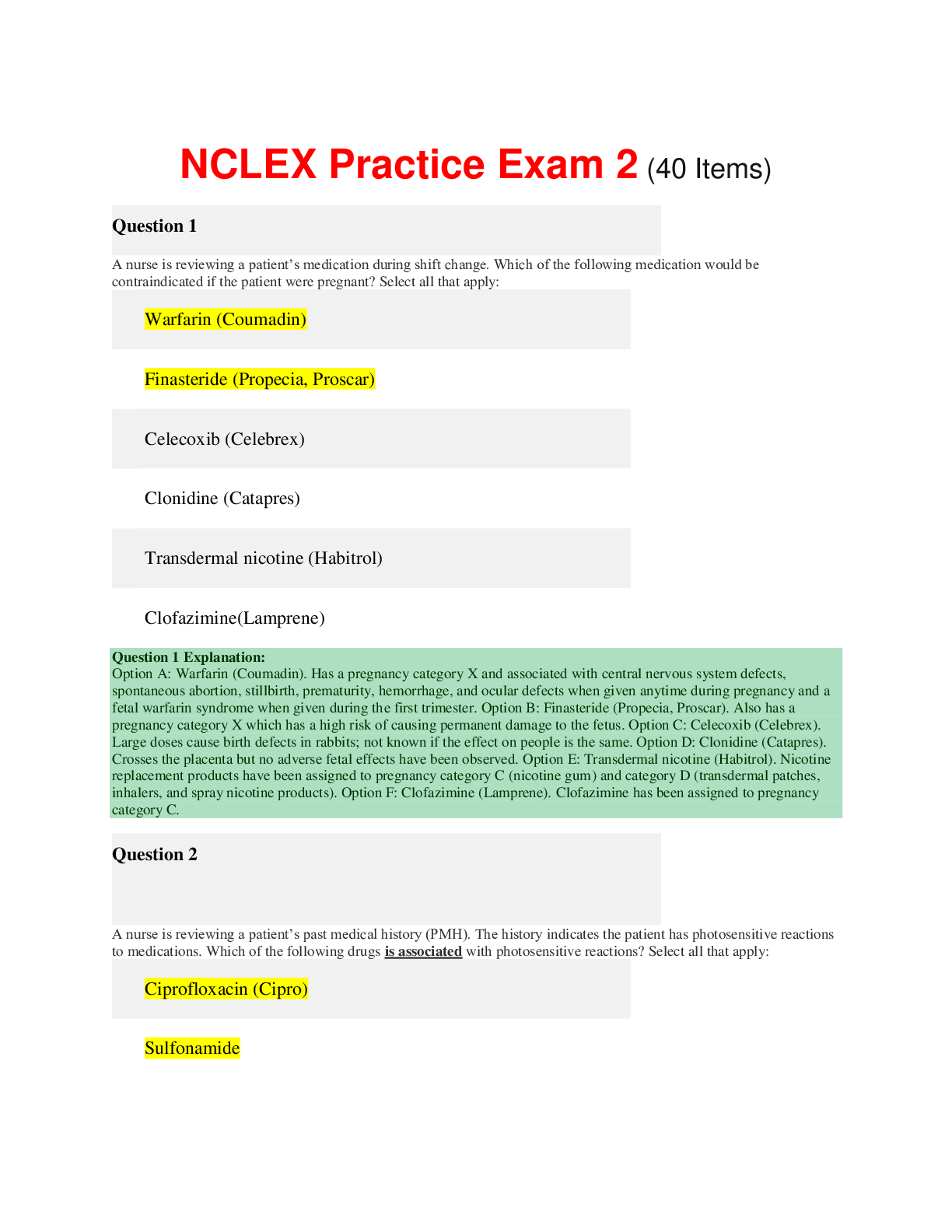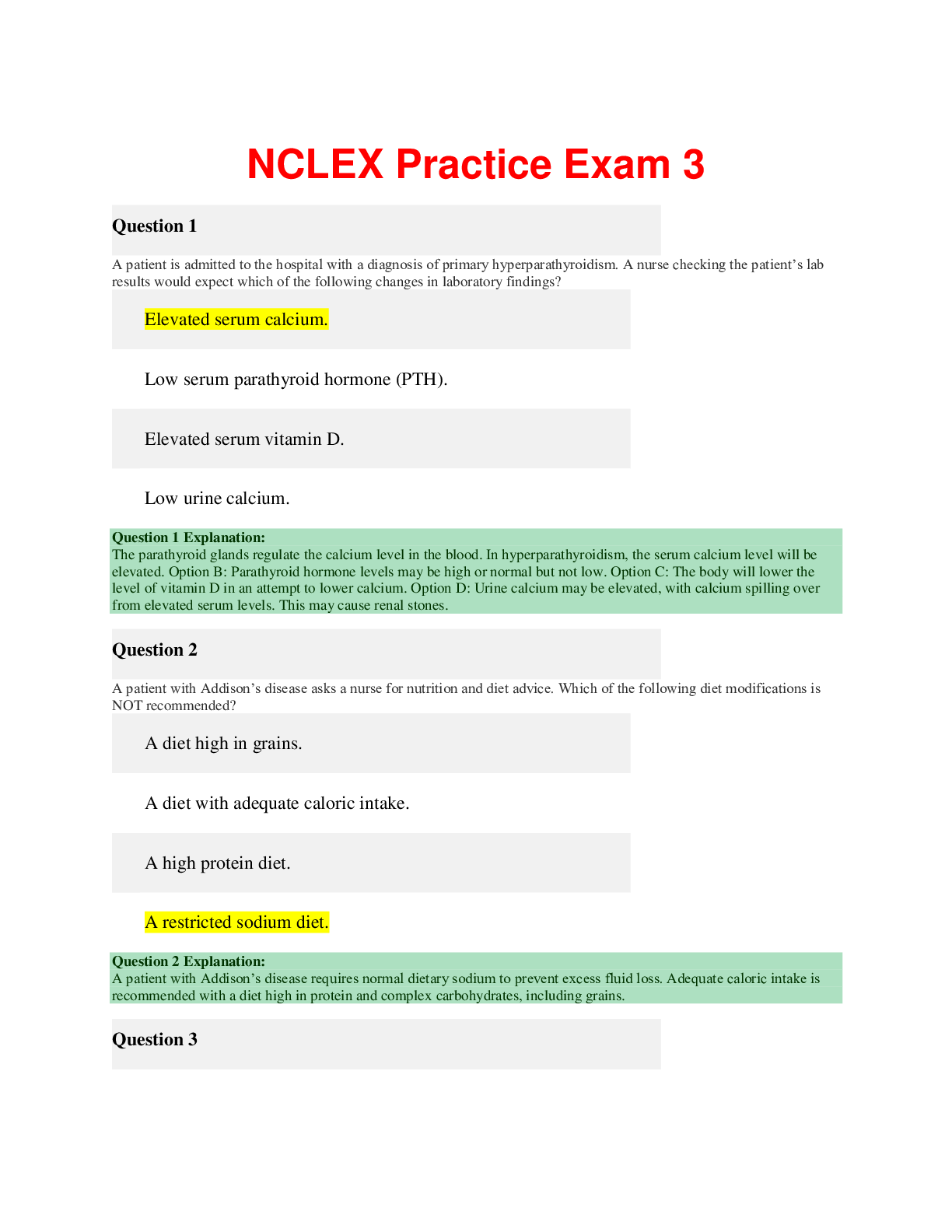*NURSING > EXAM > Ball State University - PSYCH 100 Mental Health Practice Questions And Anwers/ Rated A. (All)
Ball State University - PSYCH 100 Mental Health Practice Questions And Anwers/ Rated A.
Document Content and Description Below
Question: The nurse is working with an adolescent client with social anxiety disorder who will … attending college in 6 months. The parent tells the nurse that this anticipated change is already ca... using increased anxiety for the client. Which action reported by the client does the nurse evaluate as indicating the greatest amount of progress? The client: Question: A hospitalized client is dying and is very weak, tired and short of breath. The appropriate nursing care plan for this client and the client’s family will include: Question: The community health nurse notes several suspicious bruises and old burns on an infant. Which is the nurse’s priority action? Question: The nurse understands that the best explanation for involuntary admission for psychiatric treatment is that: Question: A client diagnosed with borderline personality disorder purposely cuts his arm with a piece of broken glass when his favorite nurse calls in sick. When the client’s favorite nurse returns to the unit, they meet to discuss the cutting incident. How can the nurse best prevent future incidents of self mutilating behavior in this client? Question: The nurse is interviewing an elderly client who may have been abused by the neighbor who provides much of the client’s care. The nurse’s interview questions should: Question: The nurse realizes that a typical characteristic of clients with anorexia nervosa is they: Question: In planning the initial care for a client with an acute schizophrenic illness, the nurse will appropriately emphasize: Question: A client is admitted to the psychiatric unit on a temporary detention order. The nurse observes that the client is staring out the 4th floor window and replying to voices that the nurse is unable to see. The initial therapeutic statement that the nurse makes to the client is: Question: The client is admitted to the hospital with injuries sustained in an automobile accident. The client, who has a history of previous arrests for driving under the influence (DUI) has an admission blood alcohol level of 0.25. When the nurse asks the client how much alcohol the client consumes daily, the nurse knows the most likely response by the client is: Question: Which behavior would best indicate that the antisocial client is making the most progress in treatment? Question: The client tells the nurse that the television set in the room is really a two way radio. The client states that “voices are coming from the TV and everything we say in this room is being recorded.” The appropriate nursing response would: Question: The nurse approaches the triage window to see a client who is well known to the emergency room staff as being a frequent visitor who demonstrates drug seeking behavior. When asked what the problem is, the client states, “I want to see the doctor. I am having chest pains.” What is the most appropriate action for the nurse to take? Question: Which treatment approach would … most therapeutic for a hospitalized client with antisocial behavior? Question: After one week in a behavior modification program, a bulimic client has gained three pounds. The nurse learns that the client still has the urge to vomit after eating. How can the nurse best deal with this behavior? Question:The nursing staff decides to develop a behavioral modification program to help a young anorexic client gain weight. Which intervention is contraindicated for this client? Question: A client with paranoid delusions believes the hospital food is being poisoned by the staff. The nurse knows the meal presentation that is the most effective method of encouraging nutritional intake is to serve: Question: The nurse enters an anorexic client’s room and finds the client doing vigorous push-ups on the floor. What is the most therapeutic nursing action? Question: The nurse would question the order if the physician prescribed a benzodiazepine for the treatment of: Question: The nurse knows which medication may … safely prescribed for a client already taking lithium (Lithane)? Question: In caring for abused children, the nurse understands that sexual abuse of children is: Question: A client is admitted through the emergency department with a diagnosis of depression. During the initial phase of the relationship with this client, the nurse would expect which reaction to interpersonal communication? Question: Which will the nurse expect to be ordered to manage a client’s withdrawal from alcohol? Question: The nursing care plan for the antisocial client should stress: Question: Thirty minutes after receiving diazepam (valium), an emergency room client reports feeling much calmer. “I can’t believe how scared I was when I came in. I will do anything to avoid having another panic attack.” The nurse realizes the most important action at this time is: Question: A client was admitted recently with a diagnosis of schizophrenia, paranoid type. Since admission, the client has had several verbal outbursts of anger but has not been violent. A staff member tells the nurse the client is pacing up and down the hallway very rapidly and muttering in an angry manner. What would the nurse do first? Question: A client has been admitted to the emergency department following a rape. The nurse will expect that the client may manifest post-traumatic stress disorder. The nurse is aware that this syndrome can … best described as: Question: The nurse has an order to administer donepezil (aricept) daily to a client with Alzheimer’s disease. The nurse knows that this drug should … administered: Question: The nurse is talking to a resident of a long term care facility who has returned from an overnight stay with his son and son’s wife. Which statement by the resident would warrant further investigation by the nurse for elder abuse? Question: Initially the nurse would expect a client to react to a diagnosis of cancer with: Question: The nurse would judge that a client might … developing Wernicke-Korsakoff syndrome when the client exhibits: Question: A priority nursing intervention for a client experiencing an acute manic episode? Question: The nurse learns that a client with OCD brushes his/her tongue several times a day and has developed ulcerations on it. The priority nursing goal for this client at this time is. The client will: Question: A client who is taking chlorpromazine hydrochloride (Thorazine) is experiencing extrapyramidal side effects (EPS). The nurse understands that EPS is: Question: Family therapy is scheduled for an anorexic client and family. The parents ask how the family therapy will help the client’s eating problems. The best nursing response is that the focus of the therapy will primarily: Question: The nurse knows an appropriate short term goal for a client exhibiting manic behavior is for the client to: Question: A client is admitted with a history of extremely elevated, irritable mood for a week. On assessment the nurse notes grandiosity, insomnia, flight of ideas, and psychomotor agitation. The nurse sets as a priority short term goal: the client will demonstrate: Question: In the early stages of Alzheimer’s disease, the nurse would anticipate that a client will retain the ability to: Question: What would the nurse most expect to observe in a client with impulsive behavior? Question: A client is being prepared to receive electroconvulsive therapy (ECT) when the nurse realizes the client has not signed an informed consent. What provides the rationale for the appropriate nursing action needed to address this issue? Question: The nurse knows the most common side effect of benzodiazepine antianxiety medications is: Question: An elderly client with Alzheimer’s disease has begun to strike out at staff members when they try to assist the client to bed at night. In addition, the staff members report that the client is awake and restless most of the night. After further assessment, the nurse decides to contact the physician for a medication order. The nurse anticipates that the physician will most likely order: Question: A client on the psychiatric unit is unresponsive or mumbles incoherently whenever the nurse asks the client questions. The nurse will best deal with the client’s communication problems by: Question: A psychiatrist admits a client to an eating disorders program. The admitting nurse learns that the client has lost 25 pounds over the last month and now weighs 85 pounds. In assessing the client, the nurse knows that an early manifestation of anorexia nervosa is: Question: A female client is seen in the emergency room with ecchymosis of the trunk, face and periorbital area. On direct questioning, the client admits to having been struck by her spouse. When offered information about shelters for battered women, the client declines stating, “I could never leave my husband because of my kids.” The nurse’s appropriate response is: Question: The nurse in the oncology unit provides support to the parents of a child newly diagnosed with glioblastoma tumor of the brain. In planning care, the nurse understands the parents’ initial reaction to a potentially terminal illness in their child is: Question: A nurse working with a client with agoraphobia recognizes that the most effective technique for treatment of agoraphobia is: Question: The nurse is preparing a brochure on marijuana use for adolescent clients. The nurse includes several reasons meant to discourage adolescents from using marijuana. Which reason is least likely to make an impression on adolescents? Question: After 6 months on lithium (lithane), the physician determines that the client is no longer responding well. After discontinuing the lithium, the physician prescribes valproic acid (depakote), an anticonvulsant that is also effective in bipolar disorders. What special instructions should the nurse give the client about valproic acid? Question: A homeless client with a history of alcohol abuse comes to the drop in shelter where the nurse volunteers. The client arrives apparently intoxicated with the smell of alcohol on the breath and admits to have been drinking to the nurse. Once admitted for the night, the client begins to shout obscenities at the other clients and staff and becomes belligerent and threatening. The nurse advises the staff and other volunteers to: [Show More]
Last updated: 1 year ago
Preview 1 out of 10 pages
Instant download
.png)
Buy this document to get the full access instantly
Instant Download Access after purchase
Add to cartInstant download
Reviews( 0 )
Document information
Connected school, study & course
About the document
Uploaded On
Oct 16, 2020
Number of pages
10
Written in
Additional information
This document has been written for:
Uploaded
Oct 16, 2020
Downloads
0
Views
68

